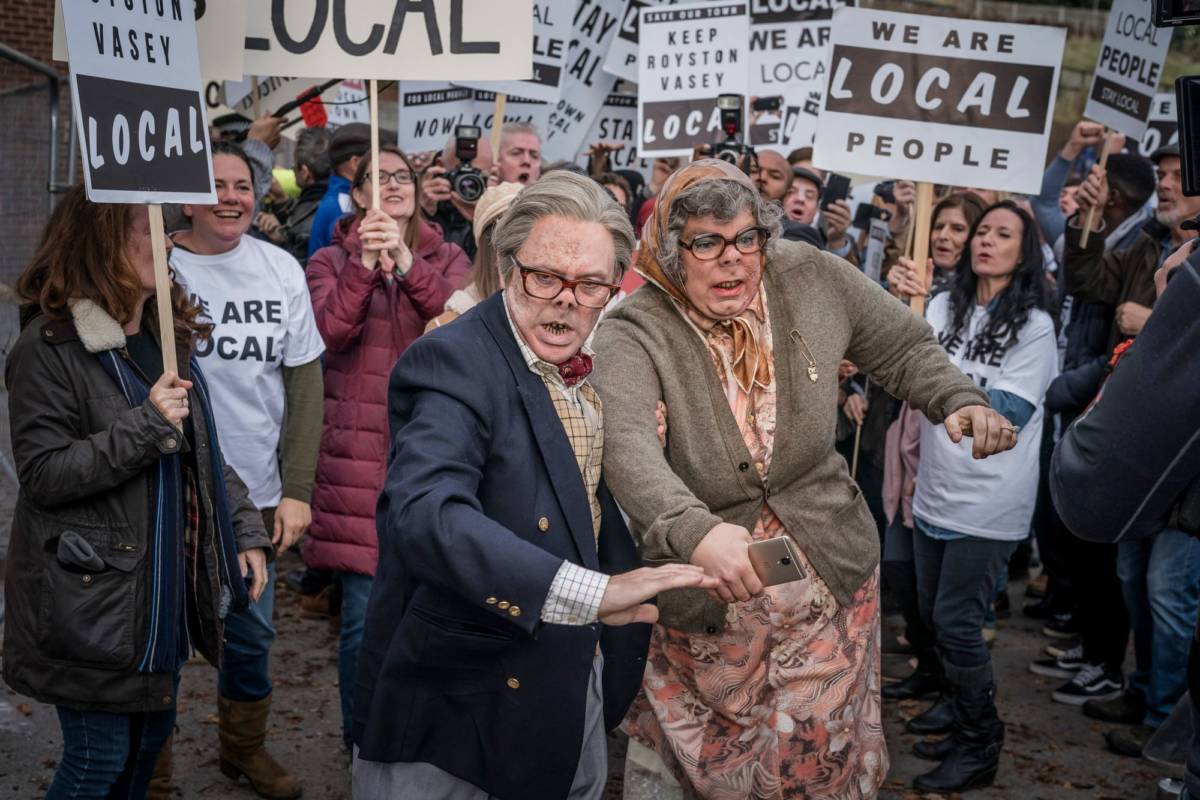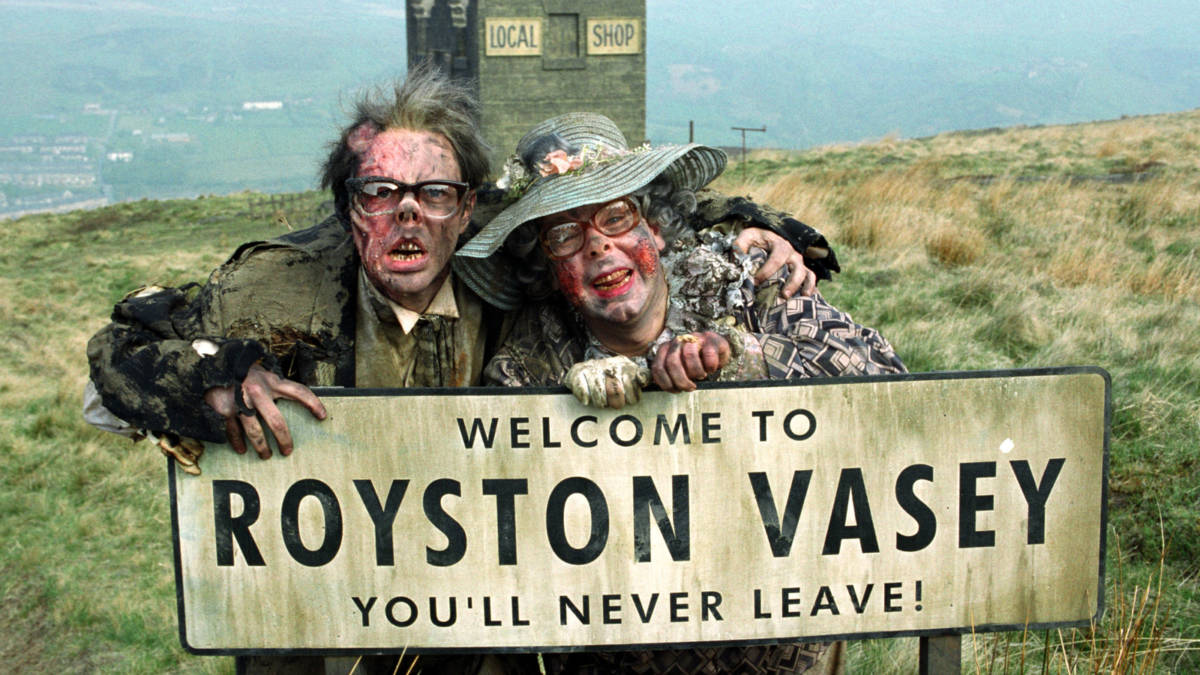Back in the ‘90s, there was a show called ‘The League of Gentlemen’. It was what you might call ‘unconventional’ – not many comedy shows before or since have taken their cues from Hammer Horrors and The Wicker Man. But there’s a reason you’re still reading about it – it was a runaway underground success, ballooning from a humble stage show to getting a radio series, a TV adaptation that ran for three series, a couple of live shows, and a film adaptation. The guys behind it haven’t done too badly, either – you’ll likely already know Mark Gatiss from Sherlock, and Reece Shearsmith and Steve Pemberton went on to do Psychoville and the excellent anthology series Inside No. 9, both in a similar vein of dark comedy to the League.
There had been talk of a revival for years before these anniversary specials were confirmed – this is a show that is remembered fondly. But the major risk in a situation like this is that the new stuff won’t live up to the originals – like the Star Wars prequels – or alternatively that there’s some rose-tinted glasses in play and the originals weren’t that good in the first place – like Star Wars, according to a small but vocal minority of critics. Neither is really the case here. Rather, the obvious criticism is that it’s leaning too strongly towards appeasing all those fans who have been waiting nigh-on twenty years for this.
Perhaps ‘appeasing’ is too negative a term there. The fans are the reason this happened, after all. But the simple fact is a first-time viewer would be utterly lost, which is perhaps why the BBC had a quick run-through of the first three series in the weeks before the anniversary specials were broadcast. And while this is partially because you need to know the established canon – which isn’t unreasonable, they’re four seasons in at this point – there’s a worrying tendency present of simply trotting out the old characters for the sake of it. This is most evident with Herr Lipp, master of the double entendre, who turns up, does his shtick, heavily implies his old plotline is going to be continued and then…that’s it, he’s nowhere to be seen for the rest of the specials.
While they’re not unceremoniously dumped off to the side after one scene, the same is true of Edward and Tubbs. Having survived their apparent deaths in series 3 (which happened because they had become too popular, hence why they had to return here), they’re now squatting in a tower block that’s due for demolition. The show does about 90% of the work to make this an analogy for Brexit and traditionalism as a whole, but ends up circling the point without actually doing anything with it – preferring to, yes, retread Edward and Tubbs’s old shtick. This points at a wider issue with these specials – with only three episodes as opposed to the six of each previous series, some elements feel rushed and cramped, yet curiously, others feel like they’re drawn out longer than they need to be.

Interestingly, Edward and Tubbs, for all their breakout success, were fairly late additions to the League’s canon. They weren’t present in the radio series, only debuting in the TV adaptation – and, if one had to be harsh, are the characters most obviously reliant on catchphrases. Not the greatest crime on its own, but it does seem to suggest that it was they more than any other characters who were responsible for David Walliams and Matt Lucas’s Little Britain, which always claimed to have been heavily inspired by the League and which quickly descended into just being the same characters with the same catchphrases, week after week – one of which, ‘I am a lady’, was literally a line Tubbs had in the second series.
Of the very few new characters introduced in these specials, there’s precisely one who receives central focus in their scenes – and his shtick, a monologue about his life that gradually cuts closer and closer to the bone, was something the League did best with the Stump Hole cavern tour guide and that they both don’t need to and shouldn’t be trying to top. This is particularly disappointing in the light of Shearsmith and Pemberton’s fine work with Inside No. 9, which, as an anthology program, introduces a new cast of characters each week and manages to establish them quickly and efficiently – and then actually do stuff with them to boot.
By contrast to Edward and Tubbs, the other breakout fan favourite, Papa Lazarou, benefited from a far, far lighter touch. He only appears onscreen for one line, but as the culmination of a genuinely creepy subplot which harks back to some of the old recurring background gags (like the public toilet that kept drowning people) without feeling too much like an out-and-out rehashing. It works so well you could almost forget that Reece Shearsmith is basically blacking up.
The League were never particularly PC – and were wont to mock the concept with the character of Ernest Foot, who’d encounter a member of a marginalised group, and, in attempting to be accepting, would say the worst things imaginable, like asking a blind man ‘how do you shave?’ with fascination. However, this doesn’t mean they took Little Britain’s route of trotting on the stereotypes with a straight-face. Their treatment of gay characters was, like everything else, close to the knuckle, but was genuinely sensitive in a way you didn’t really see in the ‘90s – which may have something to do with Mark Gatiss himself being gay. But societal values have moved on since then, and nowhere is this more obvious than with Barbara.

If it was rare to see gay characters being humanised in the ‘90s, trans characters were like hen’s teeth. And while Barbara suffered from being a case of the one joke the media knew how to make about trans people – she doesn’t pass, ho ho ho – she was by and large one of the more sympathetic characters, was accepted for who she was by the townspeople, and in the radio series was one of very few characters to receive an unambiguously happy ending (or indeed come out of it alive). So it’s a disappointment that the League have if anything gone backwards with her – even the double-entendres or her lack of filter about reassignment surgery would be preferable to what we got, which was jokes about safe spaces that literally any comment section could have written. She did get one mildly original moment – she disdains the acronym LGBT in favour of the acronym ACRONYM, that is, Actively Considering Reassignment Or Not Yet made up your Mind – but honestly, you’d expect better from the show that gave us an educational play about homosexuality called ‘Everybody Out!’
There’s a brief monologue at the end of the third episode, drawing an analogy between Benjamin’s return to Royston Vasey and the show’s return to the small screen and concluding that while he can never return for good, he can come back to visit. It’s a moment of schmaltz but it lands effectively, even given that it’s grossly incongruous with what Benjamin’s suffered over his visit (as is him returning in the first place) – it’s bluntly meta enough that everyone knows the show is addressing the fans directly. That said, as intimate as it is, it’s basically joke-free unless you count the two layers of meaning as a joke, which is a reach at best.
But there’s another analogy for the series’s return to be found in the sketches with Pauline, the monstrous jobcentre adviser. Initially it seems that, as with Herr Lipp, they’re retreading the old material – indeed, they’re doing Pauline’s bits from the first episode almost word for word. The twist is that this is all very deliberate. Pauline, it transpires, has contracted early-onset dementia, and reliving her former glories as a form of unorthodox therapy. They are quite literally redoing comedy sketches from twenty years ago for the benefit of the mentally unsound – biting the hand that feeds, perhaps, but at least this one did have some bite.
Some of the coverage you find on Cultured Vultures contains affiliate links, which provide us with small commissions based on purchases made from visiting our site. We cover gaming news, movie reviews, wrestling and much more.



